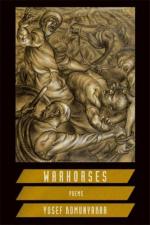|
This section contains 745 words (approx. 3 pages at 300 words per page) |

|
SOURCE: "Distortions in the Glass," in The New York Times Book Review, Vol. XCIV, No. 39, September 24, 1989, pp. 50-1.
Koestenbaum is an American educator and critic. In the following excerpt, he examines Komunyakaa's use of literary conventions in Dien cai dau.
Yusef Komunyakaa's third volume, Dien Cai Dau (Vietnamese for "crazy" and "American soldier"), renders a kind of experience so extreme it seems to forbid a merely esthetic response. These poems record Mr. Komunyakaa's service in the Vietnam War, for which he received a Bronze Star. Though his tersely-phrased chronicles, like documentary photographs, give us the illusion that we are facing unmediated reality, they rely on a predictable though powerful set of literary conventions.
First, the poems depend on orchestrated, theatrical juxta-positions—in particular, between scarifying war and succoring nature. Sometimes the vegetation or planets that frame the combat are amoral or demonic: "The moon cuts through / night trees...
|
This section contains 745 words (approx. 3 pages at 300 words per page) |

|


